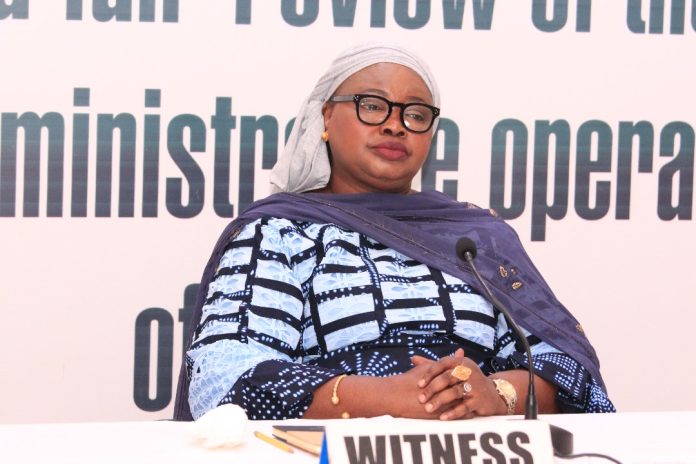By Yankuba Jallow
In a remarkable reversal of position, the Mayor of Banjul City Council, Rohey Malick Lowe, who once fiercely denounced the Presidential Commission of Inquiry into Local Government Councils as a “political witch-hunt,” appeared before the very body she sought to dismantle and offered praise instead of protest.
Her testimony on July 8, 2025, before the commission marked a dramatic shift from her earlier combative stance—one that saw her drag the State to the High Court in an unsuccessful bid to halt the proceedings altogether. Lead Counsel Patrick Gomez has repeatedly reminded the mayor that the Commission is seeking the truth and she has a right to disagree at any point about any issue being discuss; and she will be adequately allowed to present her evidence.
“Lead Counsel, I want to assure you that this commission is helping, especially BCC, because we are learning from you people a lot,” Mayor Lowe told Lead Counsel Patrick Gomez. “There are a lot of improvements in the way we do things. The Commission is helping to change the narratives. I am assuring you that when it comes to the next audit reports, you will see a lot of improvements because we are learning and we are implementing it.”
Her comments, calm and cooperative, stood in stark contrast to her earlier attempts to derail the inquiry through legal channels. In early 2023, shortly after President Adama Barrow established the Commission to probe alleged financial and administrative mismanagement across local councils from May 2018 to January 2023, Lowe led the fiercest opposition to its legitimacy.
She filed a suit before the High Court, demanding the disqualification of three commissioners whom she accused—without evidence—of political bias. Her legal team argued that their perceived allegiance to a rival political party compromised her right to a fair hearing. She also petitioned the court to declare the commission unconstitutional and stop it from investigating her council altogether.
But the court found her claims lacking in substance and dismissed the suit. The judge ruled that Lowe failed to substantiate her allegations with any proof and that the commission was legally constituted. Notably, she did not appeal the decision.
Now, more than a year later, the Mayor’s rhetoric has softened—so much so that her remarks drew audible surprise from observers present during the hearing. For months, the Commission, led by seasoned legal mind Patrick Gomez, has methodically examined financial transactions, procurement processes, and administrative decisions across multiple councils, including Banjul’s. With audit reports, payment vouchers, call logs, and testimonies, the inquiry has unearthed evidence of systemic failings and lapses in accountability.
Mayor Lowe, long considered a central figure in the investigation, admitted during her appearance that the Commission had exposed glaring administrative weaknesses at the heart of her council’s operations. She blamed much of it on the former Chief Executive Officer, Mustapha Batchilly—who has himself testified before the Commission—but also conceded that oversight under her leadership was lacking.
“I agree that there were serious lapses,” she said. “But we are working to correct them. I also take responsibility for some of the failures because, as the political head, I should have done more in terms of supervision.”
It was a rare moment of candor from a leader who had previously adopted a defensive posture whenever confronted with allegations of mismanagement. During past interrogations, Mayor Lowe often responded to Gomez’s detailed questions by saying “I don’t know” or “I wasn’t aware.” In most of those moments, Gomez would carefully walk her through relevant provisions in the Financial Manual for Local Government Councils, the Local Government Finance and Audit Act, and other legal instruments that outline the responsibilities of elected and administrative officials.
Her performance before the Commission has been closely watched by both the public and political class. Banjul, as the capital city and administrative nerve center, occupies a unique symbolic space in The Gambia’s local governance landscape. Allegations that funds meant for waste management, youth development, and infrastructure projects were misused—or not properly accounted for—have struck a nerve among residents still reeling from persistent drainage issues, uncollected garbage, and failed community programs.
One of the most damning revelations that emerged from earlier testimonies was the failure of the Council to implement or adhere to procurement procedures as outlined in the law. Documents tendered before the Commission showed that some contracts were awarded without open tender, while key transactions were approved without proper documentation. Mayor Lowe insisted during her testimony that many of these issues occurred without her direct knowledge, but she acknowledged that she should have done more to ensure compliance.
Her newfound appreciation for the Commission’s work appears to stem from what she described as a period of deep reflection and close observation. “Since the beginning of the public hearings, I have been following everything keenly,” she said. “I have been listening, I have been learning. And I know we can do better.”
Still, critics have questioned the sincerity of her change in tone. “It’s political damage control,” said a Banjul-based youth leader, speaking on condition of anonymity. “You don’t go from calling something a witch-hunt to calling it a learning experience unless the evidence has cornered you.”
Others, however, see her U-turn as a welcome sign of institutional maturity. “Leaders should be allowed to change their minds when confronted with the truth,” said a senior resident of Banjul who has been following the commission from day. “It is better to acknowledge faults and learn from them than to remain in denial.”
The Commission of Inquiry is expected to conclude its work by the end of the year. Its final report will include recommendations on administrative reforms, potential prosecutions, and new safeguards for financial accountability at the local government level.
Whether Mayor Lowe’s admission will influence those recommendations remains to be seen. But for now, her dramatic reversal offers a sobering glimpse into how accountability—when methodically pursued—can reshape even the most hardened political narratives.




















